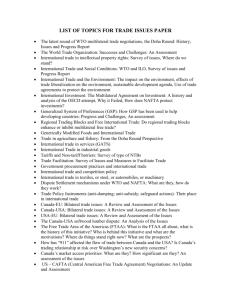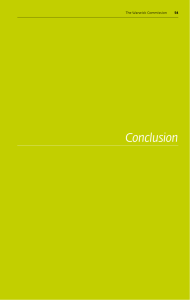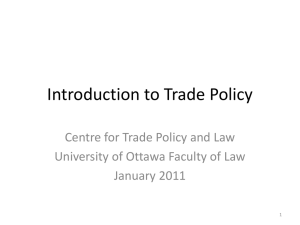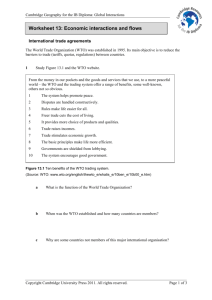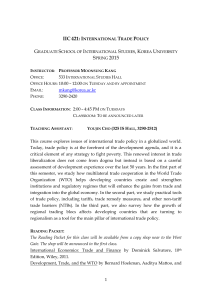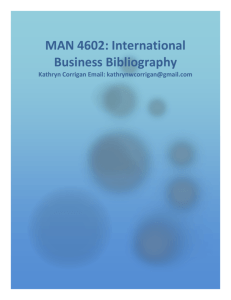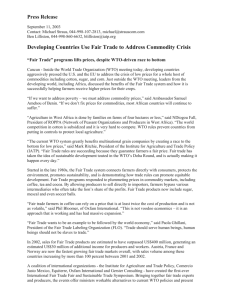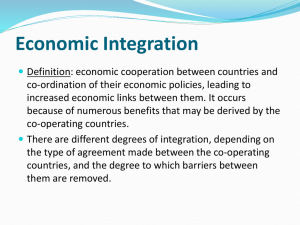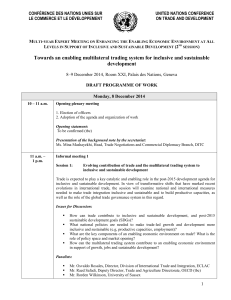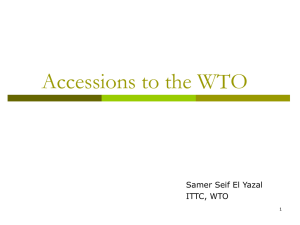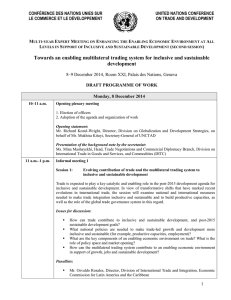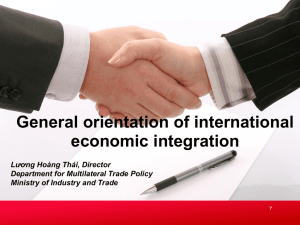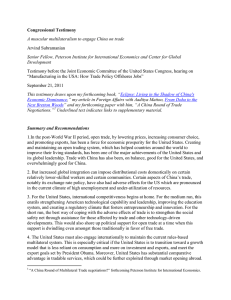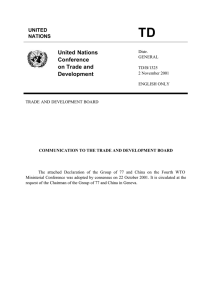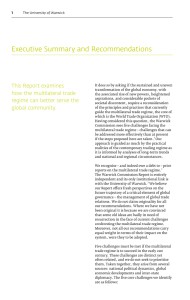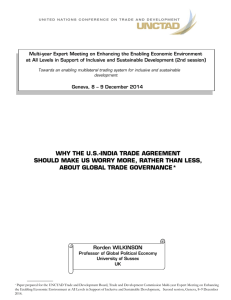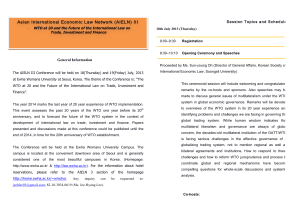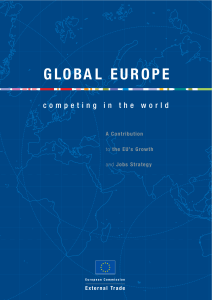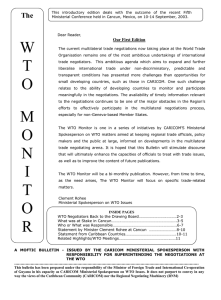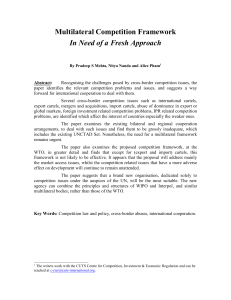International Trade and Business (GBL4107)
advertisement
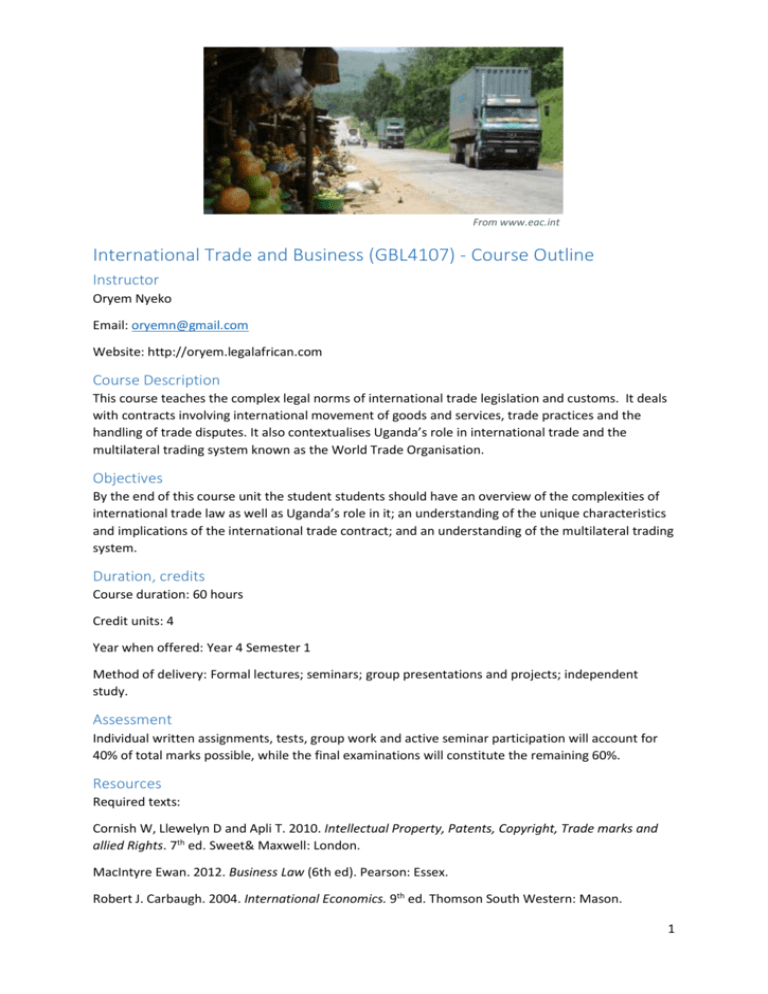
From www.eac.int International Trade and Business (GBL4107) - Course Outline Instructor Oryem Nyeko Email: oryemn@gmail.com Website: http://oryem.legalafrican.com Course Description This course teaches the complex legal norms of international trade legislation and customs. It deals with contracts involving international movement of goods and services, trade practices and the handling of trade disputes. It also contextualises Uganda’s role in international trade and the multilateral trading system known as the World Trade Organisation. Objectives By the end of this course unit the student students should have an overview of the complexities of international trade law as well as Uganda’s role in it; an understanding of the unique characteristics and implications of the international trade contract; and an understanding of the multilateral trading system. Duration, credits Course duration: 60 hours Credit units: 4 Year when offered: Year 4 Semester 1 Method of delivery: Formal lectures; seminars; group presentations and projects; independent study. Assessment Individual written assignments, tests, group work and active seminar participation will account for 40% of total marks possible, while the final examinations will constitute the remaining 60%. Resources Required texts: Cornish W, Llewelyn D and Apli T. 2010. Intellectual Property, Patents, Copyright, Trade marks and allied Rights. 7th ed. Sweet& Maxwell: London. MacIntyre Ewan. 2012. Business Law (6th ed). Pearson: Essex. Robert J. Carbaugh. 2004. International Economics. 9th ed. Thomson South Western: Mason. 1 Other recommended books and other resources are listed in the course content section below. In addition to books and other library resources the internet is a helpful resource for international trade law. Be sure to visit these websites in the duration of this course for current information and developments in international trade: The World Trade Organisation website – wto.org Ministry of Trade, Information and Cooperatives - mtic.go.ug Uganda Legal Information Institute (ULII)- ulii.org UNCITRAL (United Nations Commission on International Trade Law) -uncitral.org In addition to these websites, I will be posting international trade related articles, news and other updates regularly on my blog (http://oryem.legalafrican.com/tradelaw). I will also post courserelated information (including this outline). Course content This course is divided into four key areas over 15 weeks of classes. These areas are: an introduction to international trade and business, the international trade contract, the multilateral trading system and a course conclusion. Each area will be assessed at its conclusion through tests and/or presentations. Introduction to international trade and business – an overview of the complexities of international trade law and Uganda’s role in it Weeks 1 – 5 (Aug 18 – Sep 19) 1. Introduction to international trade and business law – syllabus and class expectations 2. Theory of trade – why do we trade? 3. The history of international trade and business – the law merchant/lex mercatoria and maritime to the WTO 4. Sources of international trade and business law a. National legislation and existing frameworks - Ministry of Trade, Industry and Cooperatives, Department of External Trade; the National Trade Policy b. The United Nations Convention on Contracts for the International Sale of Goods (Vienna, 1980) (CISG) (Uganda’s accession on 12 Feb 1992 ) c. Regional and international membership and trade agreements– i.e. EAC, COMESA, the WTO, Economic Partnership Agreements (EPA’s) Robert J. Carbaugh. 2004. International Economics. 9th ed. Thomson South Western: Mason. International trade relations 25-303 Foundations of modern trade theory 27 – 57 The international trade contract - an outline of the unique characteristics and implications of the international trade contract Weeks 6 – 10 (22 Sep – 24 Oct) 5. Drafting the international trade contract 6. Commercial terms 7. Dispute resolution and the international trade contract a. Alternative dispute resolution - forms and institutions b. Private international law/conflict of laws considerations 8. Other considerations – i.e. intellectual property, 2 MacIntyre Ewan. 2012. Business Law (6th ed). Pearson: Essex. International sales 287 – 296 Cornish W, Llewelyn D and Apli T. 2010. Intellectual Property, Patents, Copyright, Trade marks and allied Rights. 7th ed. Sweet& Maxwell: London. The multilateral trading system - an overview of fundamental World Trade Organisation rules and principles Weeks 11 – 15 (27 Oct – 29 Nov) 9. Introduction to the WTO: the evolution of the world trading system (from GATT to the WTO, the Uruguay Round) 10. Fundamental WTO principles – free trade, tariff regulation, national treatment, mostfavoured nation, development, fair competition etc. 11. WTO dispute resolution Robert J. Carbaugh. 2004. International Economics. 9th ed. Thomson South Western: Mason. Tariffs 117 – 151 Non tariff barriers 155 – 184 General Agreement on Trade and tariffs – A New Round of Trade Negotiations for the WTO 192- 200 Protection of Intellectual Property Rights 212 Trade policies for the developing nations 231 - 264 Conclusion 12. Theory and benefit(s) of the multilateral trading system and the regulation of international trade (presentation?) Robert J. Carbaugh. 2004. International Economics. 9th ed. Thomson South Western: Mason. International trade relations 25-303 Does trade make the poor even poorer 80 – 83 Trade and the environment 98 – 102 3
